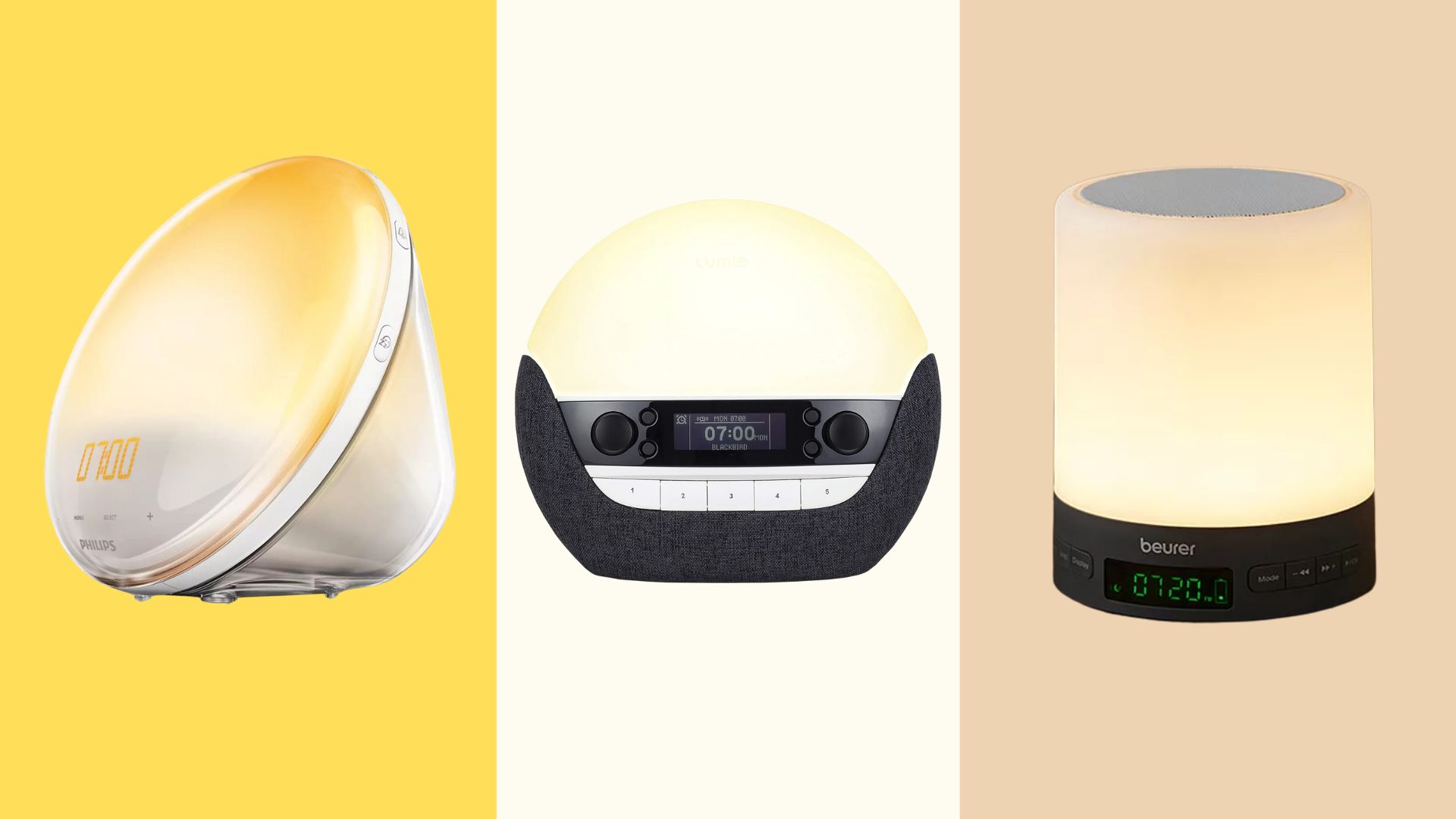
Want to improve your sleep and wonder are sunrise alarm clocks worth it? Before buying a sunrise alarm clock - a bedroom item that perhaps you've heard frequently talked about as the secret to a refreshing night's snooze - it's important to understand if you're making the right purchase for you. From light settings and sound options, to design choices and varying costs, there's much to consider before parting with your cash.
There has been somewhat of a glow forming in recent years around sunrise alarm clocks, one of the best wellness and self-care gifts, which experts say can help regulate your circadian rhythm and your sleep-wake cycle. This boosts things like the quality of your snooze, so you can wake up feeling energised and in a good mood, rather than groggy and anxious. We're serious about helping you learn how to sleep better here at woman&home, and that includes helping guide you on the items that will aid your shut-eye.
To help you discover the benefits of sunrise alarm clocks, decide if they are for you and know what to look for when you go shopping, we have called on the wisdom of three sleep experts. I'm a health writer with more than six years of experience testing products like these, and I use one particular sunrise alarm clock every night. It's been transformative for my snooze time recently, so here I reveal what I've learned from having one as well.
Are sunrise alarm clocks worth it?
If you're looking for a lighter way to wake up in the morning or want to know how to combat SAD with natural remedies, a sunrise alarm clock may be worth it as light has a significant impact on us, says Dr Ana Brito, a certified somnologist and co-founder of Somnissimo. "Our body’s internal clock, or circadian rhythm, is regulated by sunlight," she explains. "In the evening when the sun sets, our body starts producing melatonin to help us relax, fall and stay asleep. When the sun rises in the morning, our body stops producing melatonin and starts releasing other hormones that make us feel alert, such as cortisol and adrenaline."
This is how a sunrise alarm clock works. "Light in the morning, even artificial light from one of these devices, can help gently reset your circadian rhythm - and help your natural sleeping and waking cycle function optimally," reveals Dr Brito. "Unlike traditional clocks that primarily use sound, it slowly wakes you up - usually around 30 to 40 minutes before you want to get up - by increasing the amount of light in the room in a way that mimics natural sunlight, sometimes also with the accompaniment of gentle sounds."
Dr Brito notes that certain groups of people can certainly benefit from having a sunrise alarm clock. "They can help regulate the sleeping patterns of night owls, as well as shift workers, and those with seasonal affective disorder (SAD) symptoms," she explains. "In terms of health benefits, they can aid sleep quality so that you feel refreshed and less groggy upon waking, and they also help regulate your body's circadian rhythm, which controls sleep-wake cycles." Additionally, being awoken in this way may increase energy and also mood since light exposure - particularly in the morning - can stimulate the production of serotonin, a neurotransmitter associated with feelings of happiness. This makes it the perfect addition to the sleep routine of someone who wants to learn how to wake up early in the morning in winter.
What I wish I’d known before buying a sunrise alarm clock
1. Light
One of the main considerations before buying a sunrise alarm clock is about the light intensity and colour temperature. While some people like the cooler tones, I find that gentle light first thing in the morning helps me get up. "Ensure it provides a gradual and adjustable increase in light intensity," recommends Dr Katherine Hall, the sleep psychologist at Happy Beds. "The colour temperature should mimic a natural sunrise, with warmer tones initially transitioning to cooler hues. This helps regulate the body's circadian rhythm and promote a natural waking process."
2. Personalisation
Look for options that allow you to tailor the clock, depending on the time of morning and the season. We're all different and the best time to sleep and wake up will differ for everyone, so it's best to make sure that your clock's timing can be fixed to your particular schedule.
"Check for customisable settings regarding the duration and intensity of the sunrise simulation," suggests Dr Brito. "This is because the rising of light should be adapted in line with your wake-up time and the intensity with the season of the year." You want to make it feel as natural a sunrise as possible.
3. Sound
"Some have white noise for sleep built in which is great for drowning out the sounds of the city or nature as you drift off," says Stephen Goknel, a sleep expert and founder of Luff Sleep. Check if there's a timer which means it will automatically turn off after a period as well.
In the morning, Dr Hall notes: "Gentle, nature-inspired sounds or soothing melodies can enhance the waking experience. Avoid jarring or abrupt sounds, as they may counteract the calming effect intended by the sunrise simulation." This soothing sound of nature is also otherwise known as brown noise or pink noise and it can be found on several different sleep aids, including sunrise alarm clocks.

4. Bedtime
It's not all about how you wake up - if you're trying to learn how to fall asleep fast, then you may benefit from 'sunset' settings to help wind down at night. I find these particularly useful to get in the mood for sleep, especially if I've had a busy or stressful day.
"Some clocks come with adjustable lighting colours or hues, which are great if you're using the light for reading before bed," notes Goknel. "Opt for one with yellow LED lights, since blue light blocks the production of melatonin, so will make nodding off more difficult after long exposure."
5. Tech
If you're using one of the best fitness trackers to monitor your sleep, see whether your device is compatible. Many of the best Fitbits and smartwatches also allow you to record your sleep time and quality, offering an overall picture of your health.
"This could allow you to gain insights into your sleep quality and make informed adjustments to your sleep habits," explains Dr Hall.
Similarly, Dr Brito adds: "Some clocks offer additional extras like FM radio, USB charging ports or even aromatherapy options - consider if these additional features are important to you."
6. Design
You also want to think about the interiors of your bedroom before buying a sunrise alarm clock. For example, measure the space you want the device to fit in and then compare this to the measurements of the clock, that way you'll know the device will fit comfortably in the space
"It's also important that it's easy to use," says Dr Brito. "Ensure the clock has intuitive controls that are straightforward for you to navigate, and some come with remote controls or can be used via a smartphone app for added convenience."
7. Cost
Finally, Dr Brito advises thinking about brand reputation. "Research different options and read reviews to gauge reliability, durability and overall customer satisfaction," she suggests. "Price can also, of course, be a factor, so find one that fits your budget."
Before you invest, it could also perhaps be worth looking at other aspects of your sleep hygiene first to see if you can make some other changes to boost your sleep experience.
Which sunrise alarm clock is best?
I have been using the Lumie Bodyclock Luxe 750DAB for the past two years, and its impact on my sleep has been life-changing. I used to wake up with a start to the sound of my jumpy iPhone alarm and would then wonder why I felt on edge all morning. In contrast, my Lumie - which I have, pride of place, on my bedside table - gently lulls me out of my snooze by slowly flooding my room with light over the space of 30 minutes. Often, I'll wake up just before the 'sunrise' is complete, at which point it starts playing calming birdsong.
What exactly is going on inside my body? As Lumie explains, the clock "prompts the production of the body's ‘get-up-and-go’ hormone, cortisol, whilst at the same time suppressing melatonin, the hormone which is conducive to sleep". This causes a "gradual rise in heart rate and core body temperature, that emulates the natural physiological response to dawn". This is why, when I slip out from beneath the covers, I feel energised, in a good mood and ready to take on my busy day. Over the years, I've become a morning person and this is a big reason why.
One of the things I like most about the Lumie is that it is easy to use, with the option to set a week's worth of alarms in advance. The charcoal version that I have looks stylish in my bedroom and as someone who can experience whirring thoughts at night over a never-ending to-do list, the Lumie also helps me drift off. It has a dedicated 'sunset' setting that causes the light levels to gradually decrease and trigger the body's natural sleep response. Overall, this is one of the best sleep aids I've found yet.
Are there any downsides to sunrise alarm clocks?
- May not be suitable for everyone: "Individuals with certain sleep disorders or light sensitivities may find that the gradual increase in light, intended for a gentle wake-up, might not suit their needs." Consulting a healthcare professional first is advisable in such cases, says Dr Hall. "Some people also may prefer a more abrupt wake-up method or may be negatively affected by exposure to artificial light in the early morning."
- Cost: "High-quality sunrise alarm clocks with advanced features can be relatively expensive, and potential buyers need to weigh the benefits against the investment and decide whether the features align with their preferences and budget," she says.
- May not be effective straight away: It's also worth noting that there might be an adjustment period as your body gets used to waking up in this way and, if you're anything like me, you may keep waking up early concerned that you've missed the alarm. "Especially if you're used to traditional alarms," notes Dr Brito. "During this time, you might not experience the immediate benefits and persistency is key."
- Accurate set-up is essential: You should place the clock at the right distance and angle for optimal light exposure is crucial, she adds. That way it can effectively simulate a natural sunrise.
- It's not a cure-all solution: Additionally, you need to think about the rest of your sleep routine - from creating a calm space to wind down in, to taking supplements for sleep and perhaps even doing bedtime yoga.







